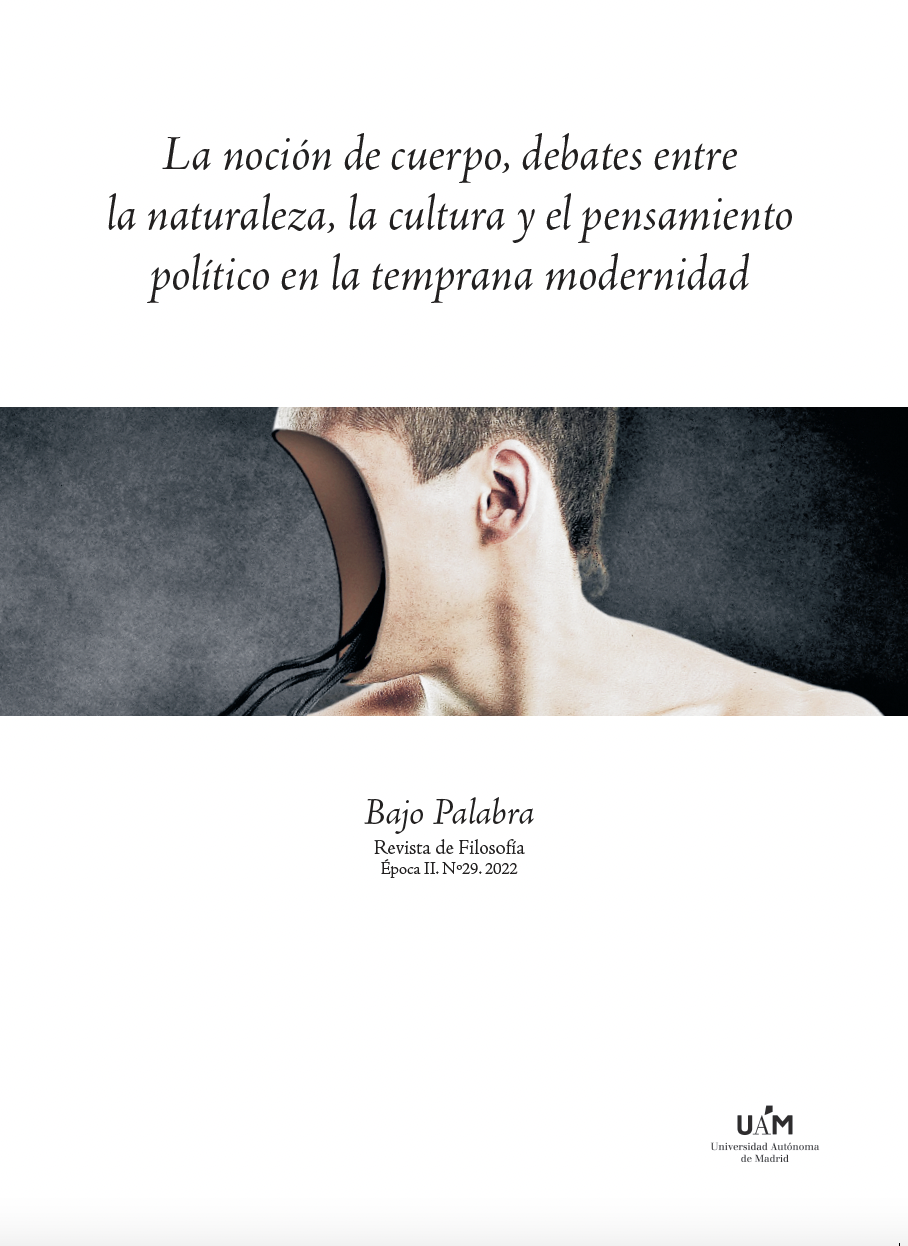Keywords:
body, resistance, individual, Baruch SpinozaCopyright (c) 2022 Antonio David Rozenberg

This work is licensed under a Creative Commons Attribution 4.0 International License.
Abstract
The present work seeks to investigate
the relationship between body and resistance
in the thought of Baruch Spinoza.
Faced with the thesis that bodies resist
the changes produced by the effects of
external bodies, he proposes to think
that said change and affection is also the
exercise of resistance. For this, the article
is divided into three parts. The first investigates
what Spinoza understands by
body. The second part develops the need
for other bodies to persevere in being.
The third part links body and resistance
under the consideration of the ethical
project of the Dutch philosopher.
Downloads
References
Abdo Ferez, C. (2017). ¿Qué puede un cuerpo?: los límites de Spinoza. Figuras
del discurso II: Temas contemporáneos de política y exclusión (pp. 89-105). Bonilla
Artigas Editores.
Aguilar, C. (2020). ¿Nadie sabe lo que puede un cuerpo? Historia de la inversión
de un error. Síntesis. Revista de Filosofía, 3(2), pp. 82-98. https://doi.
org/10.15691/0718-5448Vol3Iss2a331
Balibar, É. (2009). Spinoza, de la individualidad a la transindividualidad: conferencia
leída en Rijnsburg el 15 de mayo de 1993. Encuentro.
Balibar, É. (2011). Spinoza y lo político (C. Marchesino y G. Merlino, Trad.).
Prometeo. https://doi.org/10.3917/puf.balib.2011.01
Barry, G. (2021). Spinoza on the resistance of bodies. Studies in History and
Philosophy of Science Part A, 86, pp. 56-67. https://doi.org/10.1016/j.shpsa.
02.001
Bove, L. (2014). La estrategia del conatus. Afirmación y resistencia en Spinoza.
Cruce.
Busse, J. (2009). Le problème de l’essence de l’homme chez Spinoza, Publications de
la Sorbonne. https://doi.org/10.4000/books.psorbonne.277
Butler, J. (2015). El deseo de vivir bajo presión. La Ética de Spinoza bajo presión.
Nombres, (29), pp. 9-29.
Casarino, C. (2017). Grammars of Conatus; or, On the Primacy of Resistance in
Spinoza, Foucault, and Deleuze. Spinoza’s Authority, 1, pp. 57-85.
Chaui, M. (2000). Spinoza: poder y libertad. La filosofía política moderna. De
Hobbes a Marx, 111-141.
Comte-Sponville, A. (2010), Sobre el cuerpo: apuntes para una filosofía de la fragilidad.
Paidós.
Deleuze, G. (2001). Spinoza: filosofía práctica. Tusquetes.
Del Lucchese, F. (2009). Conflict, power, and multitude in Machiavelli and Spinoza:
tumult and indignation. Bloomsbury Publishing.
Fernández, E. (1996). Articulación crítica de ontología y política en Baruch
Spinoza. Revista de Filosofía, 15, pp. 97-126.
Gueroult, M. (1974), Spinoza. L’âme (Éthique, 2). Aubier-Montagne.
Lachterman, D. (1977). The physics of Spinoza’s ethics. The Southwestern Journal
of Philosophy, 8(3), pp. 71-111. https://doi.org/10.5840/swjphil19778356
Manning, R. (2006). Spinoza’s physical theory. Zalta, E. (Ed.), The Stanford encyclopedia
of philosophy. Metaphysics Research Lab, Stanford University.
Marzano, M. (2007). La filosofía del cuerpo. Presses Universitaires de France.
Morfino, V. (2010). Relación y contingencia. Encuentro Grupo Editor.
Ricci Cernadas, G. (2021). La multitud en Spinoza: de la física a la política. RAGIF
Ediciones.
Spinoza, B. (2019). Ética. Alianza.
Spinoza, B. (2018). Epistolario. Colihue.
Viljanen, V. (2008). On the derivation and meaning of Spinoza’s conatus doctrine.
D. Garber, & S. Nadler (Eds.), Oxford Studies in early modern philosophy (pp.
-112). Oxford University Press.
Volco, A. (2010). Una modernidad excéntrica: individuo, multitud y libertad en
Spinoza. Tesis de doctorado, Università di Bologna.
